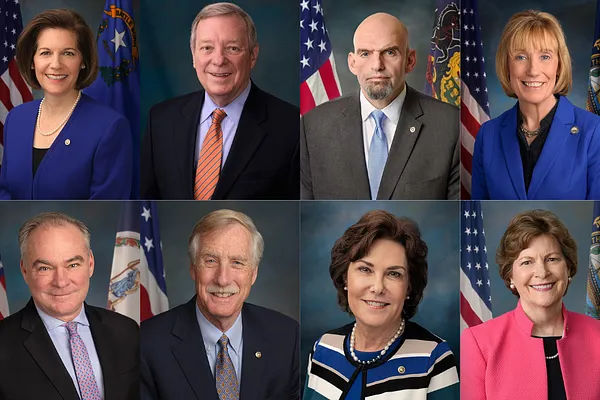The battle to prevent the corporate capture of the Biden administration has been going on since before the inauguration. As part of the Revolving Door Project’s ongoing mission to ensure that the federal government works in the public interest and not as an extension of corporate interests, RDP has been consistently involved in scrutinizing executive regulatory bodies. RDP’s work includes investigating nominees and appointees to important positions that enforce the nation’s antitrust laws and researching the capacity of those offices to fulfill their mandates. As progressive and grassroots groups push for White House officials free of ties to powerful industries such as Big Tech, Big Ag, Big Oil, and more, the pushback against monopolists is gaining momentum. With his administration, President Biden has the opportunity to use executive branch power to rein in monopolies by directing his officials to pursue anti-monopoly policy across all economic sectors. At RDP, we use our expertise and influence to contribute to the anti-monopoly movement.
The Revolving Door Project tracks the former antitrust enforcers who use the “revolving door” to switch between public service jobs and corporate gigs. Within antitrust regulators at both the leadership and staff level, there is a long history of these revolvers leveraging their federal experience to get new jobs at consulting companies and corporate BigLaw firms, just to turn around and use it to protect monopolists against the public interest they were once sworn to serve. Yet as we explained in Washington Monthly in 2020, most calls for change don’t include closing the revolving door between ostensibly “career staff” at the agencies and corporate entities. Perhaps the omission is tied to how respected officials and academics frequently and lucratively deploy their expertise at economic consulting firms that sell testimony to the government and merging parties alike. One high-profile example we have shone a light on is Fiona Scott Morton, a Yale professor, former chief economist at the Justice Department’s Antitrust Division (ATR), and consultant for Apple and Amazon. While her clear conflict of interest shocked onlookers, the many former government officials working for BigLaw and economic consulting firms suggest the problem is much larger than just one professor. On the whole, our research details how conflicts of interest at the Federal Trade Commission (FTC) and ATR are systemic obstacles to real anti-monopoly action.
To hold the sway of revolvers in check, the Revolving Door Project also provides public pushback against officials who kowtow to corporations’ interests. For instance, RDP has done substantial work criticizing Attorney General Merrick Garland’s interference in the operations of ATR, including pushing Big Tech-aligned lawyers such as Renata Hesse and Susan Davies to lead the DOJ’s Antitrust Division. Even after Jonathan Kanter was successfully appointed, Garland failed to provide Kanter with sufficient resources to enact an aggressive antitrust enforcement agenda. Meanwhile, Andrea Beaty and Eleanor Eagan discovered that Susan Davies had actually been running the Office of Legal Policy on an interim basis without that ever being disclosed to the public. Following persistent questioning, the DOJ finally publicly listed Davies on its website.
RDP also strives to contribute to the public discourse by publishing work that critically analyzes whether antitrust regulators have sufficient resources and staff to implement Biden’s priorities and by recognizing the importance of a “whole-of-government” approach to anti-monopoly efforts. As a critical part of our work promoting the importance of a whole-of-government approach to antitrust policy, RDP has analyzed the capacity of regulators to carry out the entirety of their mandates. We have done such analyses for the FTC and ATR, as well as an update on how President Biden’s spending proposals compare to recent histories of stagnant capacity.
The House Judiciary Subcommittee on Antitrust’s explosive 2020 hearing with the CEOs of Facebook, Apple, Google, and (for the first time) Amazon was an incredible example of Congress holding modern-day robber barons accountable. As the Revolving Door Project’s Eleanor Eagan wrote in The American Prospect, the hearing could be replicated for many other actors, like private equity, which similarly drive economic concentration. Nonetheless, in this context, the hearing drew out the antitrust enforcement agencies’ complicity in our current concentrated economy. As our Max Moran wrote in The New Republic, “throughout the hearing, the figures who really came off looking inept were the federal antitrust enforcement agencies—the Federal Trade Commission (FTC) and the Department of Justice (DOJ) antitrust division.”
This ineptitude might not surprise those of us who pay attention to who actually runs the agencies. As the Revolving Door Project continues to investigate, there is a crisis of incentives at the FTC and ATR, driven by the well-trodden path between government service and corporate boardrooms. We found that career-level officials leave the FTC for private law firms with alarming regularity, and the economists who advise the government on merger cases receive similar opportunities at economic consulting firms. Some officials just skip the middleman and become in-house economists or counsel at large corporations like Facebook and Amazon (in fact, as our Andrea Beaty wrote in Talking Points Memo, Big Tech poached many such officials in the run-up to the antitrust subcommittee hearing). That means former government officials end up working for firms on the other side of the courtroom from the antitrust enforcement agencies. They bring their insider knowledge of government tactics and strengths and weaknesses to their private employers and clients, who often try to avoid government oversight altogether.
Furthermore, the Revolving Door Project researches how corporate capture and conflicts of interest influence merger enforcement outcomes. The rampant use of consent agreements during the Obama and Trump administrations, which require the merging parties to divest specific assets, ultimately still allowed consolidation across entire industries. Such agreements are often riddled with conflicts of interest, such as a 2020 pharmaceutical mega-merger in which the merging companies were represented by former FTC officials in front of the FTC itself.
Some merger cases show their full effect well after the fact—take for example, the FTC-approved Covidien-Newport acquisition that forestalled the country’s planned stockpile of ventilators, a decision that had deadly consequences during the coronavirus pandemic. As Andrea Beaty wrote in The American Prospect in 2020, all five commissioners and the Bureau of Competition head at the time of the decision went on to work at private law firms after leaving the FTC. On the other side of the aisle, pharma giant Covidien’s counsel included a former FTC lawyer who also helped get approval for Google’s acquisition of DoubleClick. And these are the respected experts, the high-profile appointees—the antitrust experts that a future Biden administration might rely on to enact ostensibly progressive reforms.
In other words, there is no viable path to enduring and effective antitrust enforcement without reform to both the rules and norms around who enforces the law on behalf of the public. Reining in unfair competition by corporate America shouldn’t be a stint to turbocharge a private sector career but rather a long-term calling—a calling that should be accorded appropriate prestige and compensation. As current FTC Chair Lina Khan pursues a pro-worker and pro-consumer regulatory agenda of the sort the Revolving Door Project has long called for, she’s earned the ire of big businesses and their pro-monopoly allies. In response, RDP has shed light on the conflicts of interest underlying right-wing efforts to discredit Khan. For example, we revealed that Lorielle Pankey, the FTC ethics official who recommended Khan recuse herself from investigating Meta, owns up to $50,000 in Meta stock. Thanks in part to our revelations, a hearing where House Republicans planned to grill Khan for ignoring Pankey’s recommendation was transformed from an interrogation of Khan’s ethics into a vindication of her restoration of the FTC.
The FTC and ATR are not the only agencies that can work to dismantle monopoly power. Agencies like the Department of Agriculture (USDA), Department of Defense (DOD), Federal Communications Commission (FCC), and more also have cross-cutting responsibilities that can effectively reduce economic concentration. As our Hannah Story Brown detailed, the Federal Maritime Commission (FMC) is a woefully understaffed and underfunded entity, despite its outsized power in antitrust regulation. The FMC was caught flat-footed during the ongoing supply chain crisis, and is permeated by a culture of permissiveness, with its commissioners actively and publicly defending ocean carriers against the Biden administration’s crackdown amid record profits. RDP has also covered the role of regulators at the Federal Energy Regulatory Commission (FERC) in propping up utility monopolies. Our Dorothy Slater, for instance, revealed how Biden’s nominee to lead FERC, Willie Phillips, has an extensive history of genuflecting to corporate interests.
The Patent and Trademark Office, which we’ve covered here, is responsible for overseeing the granting of intellectual property, which effectively endows the rights-holders with state-backed monopoly power over their registered products. This is particularly fraught in the pharmaceutical industry, including the development of Covid medicines. This insidious form of serving monopolies at the expense of the public interest is something that RDP continuously covers. In particular, our Timi Iwayemi has advocated for open-source vaccine development to aid in the global fight against Covid.
The Small Business Administration (SBA), while not an antitrust regulator, plays a key role in bolstering small businesses. As our Miranda Litwak wrote for In These Times, the SBA was established by Congress to provide “opportunity for full participation in our free enterprise system by socially and economically disadvantaged persons…” And yet, business owners of color continue to endure significant disadvantages, and faced precarious situations due to the pandemic with little support from the SBA. Ensuring the survival of small businesses, particularly those owned by members of marginalized communities, is vital to dismantling monopoly power.
Since early 2022, the Revolving Door Project has been calling for a Corporate Crackdown—that is, a coordinated executive branch effort to crack down on corporate wrongdoing using regulations already on the books, picking visible fights with corporate villains who are extracting money from the masses and making the planet unlivable.
It should be the role of the government, and particularly public servants in the executive branch, to protect the public against corporate abuses—that is the responsibility they have been entrusted with in a democratic society.
Punishing corporate malfeasance is also good politics. People know that corporations and the wealthy are taking advantage of them without being held accountable. Our polling research, along with numerous recent polls by other outlets, shows that a majority of US voters across party lines support more corporate enforcement actions by the Biden administration, and believe corporations and the wealthy get away with wrongdoing too often.
Whether it’s Big Pharma lining their pockets by hiking prescription drug prices, corporate landlords raising rents in the midst of a housing crisis, or fossil fuel companies price-gouging at the fuel pump while polluting and driving climate catastrophes with impunity, the impacts of corporate wrongdoing are hitting us every day, in every aspect of our lives, and people are fed up. The FTC’s admirable campaign against junk fees is a terrific opening move in such a campaign—but it isn’t a complete campaign on its own.
The Biden administration must seize on this widespread anger and frustration by placing itself firmly on the side of workers and regular people, in clear opposition to the far too numerous bad actors among the corporate class.
Our polling has demonstrated broad, bipartisan belief that corporations and the wealthy get away with breaking the law unpunished, and high levels of support for cracking down on this wrongdoing. Our reports, including the Climate Corporate Crackdown report, outline what a whole-of-government approach to using existing regulations to interrupt corporate misdeeds would look like; and our regular newsletters and pieces in other outlets point out opportunities for the executive branch to curb corporate exploitation of the public.
Follow work in our Corporate Crackdown portfolio here.
Related Work
Our ongoing Industry Agenda series covers how monopolies and corporate interests seek to co-opt public policy to pad their profits.
Our BigLaw series tracks career staff and political appointees who revolve between government and corporate employers.
Also, see our work on Government Capacity issues, which intersects with effective regulation in anti-monopoly work and beyond.
Below you will find some of the project’s writing and research on anti-monopoly policy. For a selection of quotes and interviews on the topic, please visit this page.

January 21, 2026
Newsletter Anti-MonopolyArtificial IntelligenceClimate and EnvironmentConsumer ProtectionEconomic PolicyGovernanceHousingTechTrump 2.0
AI Is Making Your Life More Expensive
Big Tech is driving up the costs of necessities—now and in the future.

November 26, 2025
Thanksgiving Combo: Corruption Calendar and RDP Work Round-Up
This week’s newsletter recaps the Trump administration’s latest corrupt policymaking and our most notable publications over the past month.
November 25, 2025
DOJ’s RealPage Settlement Doesn’t Achieve The Corporate Crackdown Tenants Deserve
Trump’s appointees have negotiated a settlement which requires restrictions on RealPage’s use of nonpublic rental data and current lease information, but appears to stop short of financial penalty or admission of wrongdoing.

November 14, 2025
Top Trump Official Failed To Disclose Conflicts of Interest for Entire Justice Department Tenure
A Department of Justice official managed to serve in Trump’s administration without disclosing his financial entanglements publicly – and now, only after his departure, can we highlight his conflicts of interest.

November 13, 2025 | Watchdog Weekly
8 Ways Senate Dems Should Have Been Holding the Line With Oversight
Here’s a congressional oversight target for each of the eight Senate Democrat that caved to end the government shutdown.

October 31, 2025 | Watchdog Weekly
Corruption Calendar Weeks 40-41: Belle of the Ballroom
Crypto interests and White House ballroom donors are the biggest beneficiaries of the administration’s latest rounds of corruption.

October 08, 2025 | The Sling
The Hollowness of Growth as an Objective
Growth is responsible for the widely shared prosperity ushered in across much of the world in the twentieth century, leading to declines in infant mortality, longer life expectancy, and some of the best standards of living in human history. But growth has also driven mass deforestation, soaring income inequality, and the erosion of democracy as power became increasingly concentrated. When a handful of companies control local television stations, it’s easier for a president with authoritarian tendencies to punish his perceived enemies. Acknowledging that duality and seeking balance is different than monomaniacally pursuing economic growth or degrowth.

October 06, 2025
Railroad Barons Launch an Astroturf Campaign For Their Mega-Merger
Those supporting a new railroad monopoly include paid-off politicians, business partners, and… an anti-monopoly group?

August 26, 2025
Kenny Stancil Hannah Story Brown Henry Burke
Press ReleaseReport AbundanceAnti-MonopolyClimate and EnvironmentHousingTech
Revolving Door Project, Open Markets Institute Release Report on Abundance Agenda
This report sets out to excavate the proposed policy prescriptions of the broader abundance movement, and thoroughly address their flaws.

August 20, 2025 | The American Prospect
Henry Burke Dylan Gyauch-Lewis
Op-Ed Anti-MonopolyEconomic MediaEthics in GovernmentExecutive BranchFinancial RegulationFintechTech
What Trump Learned From Silicon Valley
Before DOGE’s lawbreaking spree, there was ‘blitzscaling.’

August 07, 2025
Uber Wrong
In his latest broadside against the left, Mattew Yglesias took aim at longtime critics of Uber’s blatant lawbreaking. In Yglesias’s view, these critics who range from anti-monopoly voices like Lina Khan to anti-corruption experts like our own Jeff Hauser and academics focused on financial regulation like Professor Hillary Allen, constitute a coterie of economics-hating zealots eager to make people’s lives worse.

June 11, 2025 | Citations Needed
Interview AbundanceAnti-MonopolyArtificial IntelligenceClimate and EnvironmentEconomic MediaEconomic PolicyGovernment CapacityMatt Yglesias
PODCAST: RDP's Kenny Stancil and Henry Burke Discuss "Abundance" as Counter to Left Populism on Citations Needed
Revolving Door Project senior researchers Kenny Stancil and Henry Burke joined Citations Needed to talk about the so-called Abundance agenda, including how it’s being promoted as an alternative to a downwardly redistributive economic populism.

June 03, 2025
Who’s Behind Abundance Coachella?
Donors to the group behind WelcomeFest include tech baron Reid Hoffman, Walmart heirs, and Michael Bloomberg.
April 21, 2025
Polling Tracker: Americans’ Opinions of Oligarchy and Corruption
Tracking Americans’ opinions on corruption and oligarchy in the Trump 2.0 era. Updated regularly with for organizers and activists.
March 18, 2025
Release: Trump’s Attempt To Fire Democratic FTC Commissioners Makes Americans Easy Targets For Corporate Abuse
In response to President Trump’s decision to attempt to fire the Federal Trade Commission’s Alvaro Bedoya and Rebecca Kelly Slaughter, Revolving Door Project Founder and Executive Director Jeff Hauser issued the following statement.
